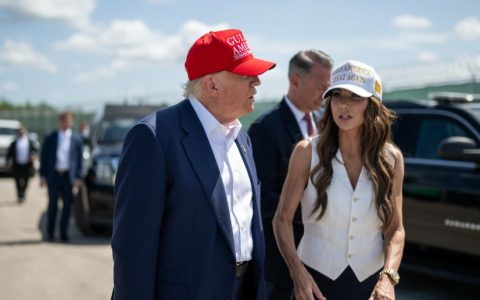
The Trump family has become a powerful force. It’s not just Donald anymore.
As now a Trump family member’s officially made a decision on running for U.S. Senate.
Michael Whatley, the Republican National Committee Chairman, is set to enter the race for the North Carolina Senate seat currently occupied by a fellow Republican. Whatley aims to succeed Sen. Thom Tillis, who recently confirmed he will not pursue another term after opposing President Trump’s “One Big Beautiful Bill Act” earlier this month, according to two sources cited by POLITICO.
Lara Trump, President Trump’s daughter-in-law, opted against running for the seat and will continue hosting her weekly Fox News program. Having co-chaired the RNC with Whatley last year, she is expected to endorse his candidacy, per the same sources.
POLITICO reports that Whatley’s campaign announcement is anticipated within the next week to 10 days. Elected RNC chairman in March 2024, Whatley played a key role in securing GOP control of Congress and the White House. “The president feels Whatley has earned his shot,” one source told the outlet.
President Trump is expected to name a new RNC chairman around the same time Whatley launches his Senate bid. Meanwhile, former North Carolina Gov. Roy Cooper, a Democrat, is poised to declare his candidacy for the same seat as early as Monday.
Why the 2026 Midterms Are Pivotal for the Trump Administration
The 2026 midterm elections are shaping up to be a defining moment for President Trump’s second term, as they will determine whether his administration can maintain the momentum needed to advance its ambitious agenda. With Republicans currently holding slim majorities in Congress, the midterms will test the party’s ability to consolidate power and push through key legislative priorities, such as tax reform, border security enhancements, and deregulation efforts championed by Trump and his allies.
The North Carolina Senate race, where RNC Chairman Michael Whatley is expected to run, exemplifies the high stakes. Whatley’s alignment with Trump’s vision could solidify GOP unity in the state, a critical battleground. His leadership at the RNC, which helped deliver Republican victories in 2024, positions him as a strong contender to carry forward Trump’s policies in the Senate. A win here would strengthen the GOP’s Senate majority, providing a crucial buffer for passing legislation.
Nationally, the 2026 midterms will feature 33 Senate seats and all 435 House seats, with Republicans defending several seats in competitive states. The outcome will shape Trump’s ability to enact policies like extending the 2017 tax cuts, which are set to expire in 2025, and implementing stricter immigration measures. Political analysts note that midterm elections often favor the opposition party, making GOP gains essential to counter potential Democratic surges.
2026 Generic Ballot Poll
🔴 Republicans: 52% (+8)
🔵 Democrats: 44%RMG | June 18-19 | 1,000 RV pic.twitter.com/yd7TRjM54V
— OSZ (@OpenSourceZone) June 24, 2025
Trump’s endorsement of candidates like Whatley signals a strategy to back loyalists who share his America First priorities. This approach aims to maintain party cohesion, avoiding the internal rifts seen in past GOP administrations. The president’s active involvement in candidate selection could energize the Republican base, driving turnout in key races.
In the House, Republicans face the challenge of retaining their majority amid redistricting and shifting demographics. Strong GOP performances in swing districts will be vital to prevent a divided Congress that could stall Trump’s initiatives. The administration’s focus on economic growth and energy independence is likely to resonate with voters if tangible results are evident by 2026.
The Senate landscape is equally critical, with races in states like Michigan, Virginia, and Ohio expected to be fiercely contested. A robust GOP majority would ease the confirmation of Trump’s judicial and administrative nominees, ensuring long-term influence on the judiciary and federal agencies. This is particularly important for advancing conservative policies on issues like Second Amendment rights and education reform.
Whatley’s potential candidacy in North Carolina highlights the GOP’s efforts to field candidates who can bridge Trump’s populist base with traditional conservative voters. His RNC tenure demonstrated organizational prowess, which could translate into a disciplined campaign against Democratic contender Roy Cooper, a seasoned politician with statewide name recognition.
Economic conditions will play a significant role in the midterms. Trump’s administration has prioritized policies aimed at boosting job creation and reducing inflation, which could bolster GOP candidates if successful. However, any economic downturn could complicate Republican efforts, making it imperative to communicate achievements effectively to voters.
On the Democratic side, figures like Cooper are likely to frame the midterms as a referendum on Trump’s leadership. Democrats may focus on issues like healthcare and climate policy to mobilize their base, but GOP strategists believe Trump’s emphasis on practical, results-driven governance will appeal to undecided voters in battleground states.
The midterms also offer Trump an opportunity to cement his legacy by supporting candidates who can sustain his policy vision beyond his term. A strong GOP showing would enable the administration to tackle ambitious goals, such as infrastructure modernization and trade policy reforms, with less legislative resistance.
Stay tuned to the DC Daily Journal.





